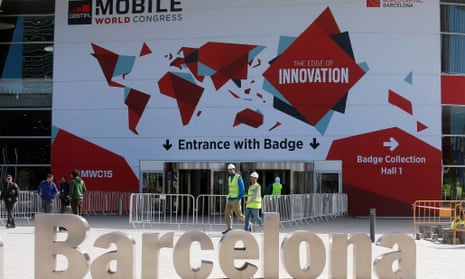The world’s largest mobile technology event kicks off on Sunday with more than 86,000 salespeople, software engineers, chip designers, device makers and television crews arriving in Barcelona for the five-day event.
With Facebook’s Mark Zuckerberg headlining, alongside Google rising star Sundar Pichai and the omnipresent Will.i.am, who has moved from recording music into designing electronic wristbands, the Mobile World Congress will fill the halls of two separate exhibition centres and take over countless unofficial venues around the Catalan capital.
Among the big themes this year will be 5G, the faster wireless internet successor to 4G, and the challenges bringing the developing world online. Executives from Twitter, Facebook, Pinterest and Airbnb will ensure that the rise of social media remains a talking point.
But the event’s organisers have for the most part steered clear of the more controversial topics that have lit up online discussion forums since Edward Snowden’s revelations two summers ago. At MWC 2015, surveillance and the ethical dilemma presented by commercialising private data will for the most part remain off the agenda.
“We will have government officials and policy makers there and private companies there but no one speaking for the users, especially the most vulnerable,” says Peter Micek, policy counsel at digital human rights campaign group Access. “The fact that civil society is not invited to the biggest mobile technology event in the world says something.”
With 2,000 exhibitors jostling for attention, corporations will be well represented. The US Agency for International Development (USaid) is also taking part this year, but charities and campaign groups remain thin on the ground. There is a panel discussion on Monday about data protection, but the speakers all represent corporate interestests other than Mozilla, the not for profit maker of the Firefox browser.
Access has worked closely with networks like Vodafone, whose Egyptian masts were temporarily shut down during the Tahrir Square uprising of 2011, to create guidelines for how mobile phone companies should respond when asked to implement a communications blackout. But Micek says blackouts are increasing. It recently filed evidence to the international criminal court on events in the Central African Republic, where Orange and three other networks were asked to suspend text messages and international roaming for a period last summer. The blackout coincided with reports of increased civil unrest.
Net neutrality, however, will be under discussion, both at the ministerial side-conference, where the UK’s telecoms minister Ed Vaizey will rub shoulders with his Rwandan counterpart Jean Philbert Nsengimana, and on the main stage.
The US Federal Communications Commission (FCC) last week voted to grant itself the power to enforce net neutrality, for example by preventing cable and mobile phone companies from charging to deliver traffic more quickly for those that can afford the fee. On Tuesday evening in Barcelona, FCC chairman Tom Wheeler will explain in a keynote speech the decision which he has described as “a red letter day for internet freedom”.
Apple as always will be notable by its absence from Barcelona, but South Korea’s Samsung and Taiwan’s HTC will use the trade show to unveil the latest editions of their flagship handsets.
The Samsung S6 and the HTC One (M9) will make their first public appearance within hours of each other on Sunday night. With every attendee offered a fitness band to track their activity levels, calorie burn should go off the scale as reporters and analysts dash across town to catch both events.
The S6 is Samsung’s big money spinner and the stakes are higher than ever this year, with the company sliding in profitability as Apple cements its dominance in the west and conquers new markets like China.
Samsung is expected to release two models, one with a screen that curves over three edges, and another more conventional handset. The practical benefits of a multisided screen aren’t entirely clear, although Samsung claims to be the only company able to produce them. But Samsung is likely to follow Apple’s lead by using a processor designed by its own engineers, instead of the Qualcomm chips of previous models.
The S6 has been conceived not only as a competitor to the iPhone, but to advertise Samsung’s ability to make components like screens and chips for other device manufacturers. Samsung’s latest numbers explain the shift in emphasis. According to Bloomberg, operating profit at the chip division surged 36% to 2.7 trillion won (£1.6bn) in the fourth quarter, while mobile-phone unit earnings slumped 64% to 1.96 trillion won (£1.2bn).
With Apple Watch launched on 9 March, a flurry of rival products are under development. Microsoft, which is expected to unveil mid range Lumia phones running its latest Windows 10 software on Monday morning in Barcelona, may have a wearable project in the pipeline and there are rumours of a smartwatch from HTC.
Telecoms analyst Kester Mann, of CCS Insight, is predicting “an avalanche of wearable devices”, but also many more gadgets with which to populate the much discussed Internet of Things. Stands projecting a future of smart cars, homes and cities will no doubt draw the crowds, but Mann says these inventions have implications that their creators must consider.
“Switching your lights off, your alarms, linking all this up to a cellular network … security is important and privacy is fundamental. That’s an area where the industry needs to tread very carefully as it moves into a new era.”

Comments (…)
Sign in or create your Guardian account to join the discussion